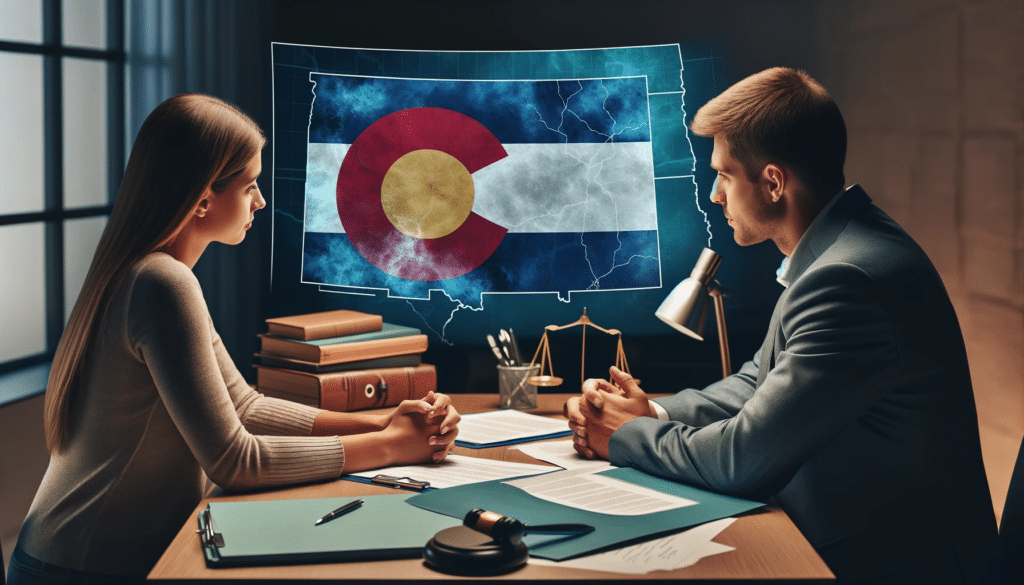Physical Address
304 North Cardinal St.
Dorchester Center, MA 02124
Physical Address
304 North Cardinal St.
Dorchester Center, MA 02124

Filing for divorce in Colorado can feel like trekking through the Rocky Mountains — a journey that weaves through legal complexities and personal transformations.
Colorado’s divorce laws create a unique landscape, each with its own set of rules and requirements.

From understanding residency qualifications to navigating the intricacies of legal documentation, every step is pivotal. But, this journey doesn’t have to be daunting. This article is like your trail map, guiding you through Colorado’s divorce laws.
We’re here to simplify the legal terms and empathize with the emotional aspects of this process. Ready to embark on this path in the Centennial State? Keep reading to learn about the essential steps for filing for divorce in Colorado, and start your journey towards a new chapter with clarity and confidence.
For more on how to file for divorce, check out our article, How to File for Divorce: A Concise Guide for Couples.
In order to proceed with a divorce in Colorado, at least one spouse must have been a resident of Colorado for a minimum of 91 days prior to filing. This residency requirement ensures that the divorce is filed in the appropriate jurisdiction.
Colorado is a no-fault divorce state, which means that spouses do not need to prove fault in order to obtain a divorce. Instead, they only need to state that the marriage is irretrievably broken with no chance of reconciliation. This simplifies the divorce process and eliminates the need to assign blame or prove misconduct.
| Residency Requirement | No-Fault Grounds | County-Specific Requirements |
|---|---|---|
| At least one spouse must be a resident of Colorado for 91 days prior to filing | Parties must state that the marriage is irretrievably broken with no chance of reconciliation | Each county court may have specific rules and guidelines |
By understanding the eligibility requirements and grounds for divorce in Colorado, you can ensure that you meet the necessary criteria to proceed with your divorce. Consulting with an attorney and familiarizing yourself with the specific requirements of your county court can help you navigate the divorce process with confidence.

While it is possible to navigate the divorce process in Colorado without an attorney, seeking advice and guidance from a qualified divorce attorney can be highly beneficial.
An attorney can provide valuable insights into your rights and obligations, as well as help you understand the complexities of the legal process. They can offer personalized advice based on your unique circumstances, ensuring that you make informed decisions throughout the divorce proceedings.
When consulting with a divorce attorney, you can expect them to review your case, explain the relevant laws and regulations, and help you understand the potential outcomes of your choices.
They can also guide you in strategizing for negotiations, mediation, or court proceedings, depending on the specific circumstances of your divorce. By working with an attorney, you can have peace of mind knowing that your interests are being protected and that you have a knowledgeable advocate by your side.
| Why Consult with a Divorce Attorney? | Benefits |
|---|---|
| Understanding your rights and obligations | Ensure you make informed decisions throughout the divorce process |
| Exploring your options for divorce | Learn about the different types of divorce and which one is best for you |
| Receiving personalized advice for your situation | Get guidance tailored to your unique circumstances |
| Guidance through negotiations or court proceedings | Have an experienced advocate by your side |
| Ensuring the protection of your interests | Ensure your rights are protected and your interests are represented |
Once you have determined your eligibility and grounds for divorce in Colorado, the next step is to prepare and file the necessary divorce forms. These forms outline the details of your marriage, assets, children, and desired outcomes for property division and child custody.
By providing accurate and complete information, you can ensure that your interests are properly represented in the divorce proceedings.
Preparing the divorce forms involves carefully filling out the Petition for Dissolution of Marriage or Legal Separation and the Summons for Dissolution of Marriage or Legal Separation.
These documents require you to state your personal information, such as name, address, and date of birth, as well as provide details about your marriage and the reasons for the divorce. Be thorough and honest when completing these forms to avoid any complications or delays in the process.
Once the divorce forms have been prepared, they must be filed with the appropriate Colorado court. You will need to submit the original forms along with any copies required by the court. Keep copies for your own records as well.
The court will typically charge a filing fee, though waivers may be available for those who cannot afford it. After filing the forms, you will receive a case number, which you should keep handy for any future correspondence with the court.
| Forms to Prepare and File | Instructions |
|---|---|
| Petition for Dissolution of Marriage or Legal Separation | This document outlines the reasons for the divorce and the desired outcomes for asset division and child custody. Fill it out accurately, providing all necessary details. |
| Summons for Dissolution of Marriage or Legal Separation | The summons notifies your spouse that legal action has been filed against them. Fill it out with the required information and ensure it is served to your spouse. |
After preparing the necessary divorce forms, the next step is to serve the papers to your spouse. Serving the divorce papers signifies that your spouse has been officially notified of the divorce proceedings. This step ensures both parties have an opportunity to respond and participate in the legal proceedings.
There are several methods for serving the divorce papers. One option is to arrange for personal service, where a neutral third party delivers the papers directly to your spouse.
Another option is to hire a professional process server who specializes in serving legal documents. They will ensure that the papers are delivered according to the legal requirements.
If personal service or hiring a process server is not feasible, you may be able to serve the papers by mail. However, check the specific requirements in your jurisdiction, as some courts may have additional rules or restrictions regarding serving divorce papers by mail.
| Method | Description |
|---|---|
| Personal Service | A neutral third party delivers the papers to your spouse in person. |
| Process Server | A professional process server is hired to deliver the papers following legal guidelines. |
| Service by Mail | Papers are mailed to your spouse according to the specific rules and requirements in your jurisdiction. |
Keep proof of service once the papers have been served. This may include a signed acknowledgment of receipt from your spouse, a completed proof of service form, or a certificate of service. The proof of service is necessary to demonstrate to the court that your spouse has been properly served and is aware of the divorce proceedings.
Once the divorce papers are served, your spouse has a specific timeframe to respond. They can either agree to the terms of the divorce or contest certain issues.
If your spouse does not respond within the given timeframe, you may be able to proceed with a default judgment. If they contest the divorce or any of the terms, further legal proceedings may be necessary, such as mediation or a court hearing.
| Step | Description |
|---|---|
| Preparing the Divorce Forms | Gather the necessary forms, provide accurate information. |
| Filing the Documents | Submit the completed forms to the appropriate Colorado court. |
| Serving the Divorce Papers | Serve the documents to your spouse, ensuring they are aware of the proceedings. |
| Responding to the Petition | Wait for your spouse’s response and proceed accordingly. |

If you and your spouse are unable to reach an agreement on all issues related to your divorce, a court hearing will be necessary. This hearing allows both parties to present their case before a judge, who will make decisions on contested matters such as asset division, child custody, and alimony.
You’ll want to be well-prepared for the court hearing, as the judge’s decisions will have a significant impact on the outcome of your divorce.
During the court hearing, both you and your spouse will have the opportunity to present evidence, call witnesses if necessary, and argue your side of the case. The judge will carefully consider the information presented and make decisions based on the best interests of both parties involved.
It’s important to be organized and articulate when presenting your case, as well as to respond respectfully to any questions or concerns raised by the judge.
Preparing for a court hearing involves gathering all relevant documents and evidence that support your position. This may include financial records, custody agreements, and any communication or documentation related to your divorce.
It is also advisable to consult with an attorney who can guide you through the process and help you navigate the complexities of the legal system.
| Important Points to Consider |
|---|
| 1. Gather all necessary documents and evidence to support your case. |
| 2. Be organized and articulate when presenting your side of the case. |
| 3. Respond respectfully to any questions or concerns raised by the judge. |
| 4. Consider consulting with an attorney to guide you through the process. |
Attending a court hearing can be a daunting experience, but with careful preparation and the guidance of legal professionals, you can navigate the process more confidently. Remember to remain calm and composed during the hearing and to focus on presenting your case in the best possible light.
By following these steps, you can ensure that your interests are properly represented as the judge makes decisions regarding your divorce.
| Gather all necessary documents and evidence to support your case. |
| Be organized and articulate when presenting your side of the case. |
| Respond respectfully to any questions or concerns raised by the judge. |
| Consider consulting with an attorney to guide you through the process. |
Filing for divorce without an attorney is an option for those who feel confident in navigating the process themselves.
However, you’ll need to consider the potential complexities and seek professional guidance if needed. Filing without an attorney can save money, but it requires careful attention to detail and a thorough understanding of Colorado divorce laws.
When filing without an attorney, familiarize yourself with the necessary forms and the specific requirements of the court where you will be filing. Colorado provides all the required forms for completing a divorce, which can be found on the court’s website.
Additionally, ensure you understand the financial disclosure requirements. Colorado requires both parties to provide a complete and accurate financial disclosure.
This includes disclosing all assets, liabilities, incomes, and expenses. Failing to provide accurate financial information can have serious consequences.
While filing for divorce without an attorney can be challenging, it’s possible to do so successfully with thorough research and careful attention to the details. However, if at any point you feel overwhelmed or unsure, it is strongly recommended to seek professional legal advice to protect your rights and ensure a fair outcome.
Filing for divorce in Colorado can be a complex and emotional process, but understanding the necessary steps can help simplify the journey.
Remember, if an agreement cannot be reached on all issues, a court hearing may be required. The judge will make decisions on contested matters such as asset division, child custody, and alimony. Preparation for the court hearing is crucial, as the judge’s decisions will have a significant impact on the outcome of the divorce.
To see how this process of filing for divorce in Colorado compares to that in other states, check out our articles about how to file for divorce in Montana and filing for divorce in New Mexico.
At least one spouse must have been a resident of the state for 91 days prior to filing.
No, Colorado is a no-fault divorce state. Spouses only need to state that the marriage is irretrievably broken with no chance of reconciliation.
While it is possible to file for divorce without an attorney, consulting with one can provide valuable guidance and ensure that your interests are protected.
The necessary forms include the Petition for Dissolution of Marriage or Legal Separation and the Summons for Dissolution of Marriage or Legal Separation.
The divorce papers can be served personally, through a process server, or by mail. Proof of service is necessary.
The divorce papers must be filed with the appropriate Colorado court.
A court hearing is required, where each side presents their case and the judge makes decisions on contested issues.
Colorado follows the best interests of the child standard, considering factors such as the child’s relationship with each parent and their adjustment to home and school.
By understanding the eligibility requirements, consulting with an attorney, properly preparing the required forms, and considering the specific issues that may arise when divorcing with children.